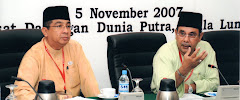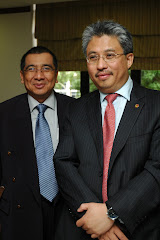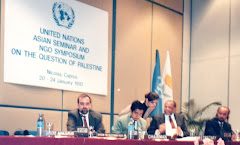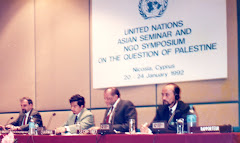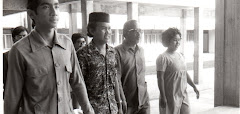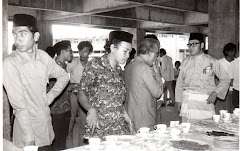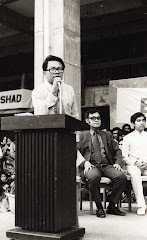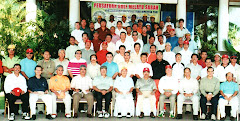Rocket United Restaurant
5-10% of their earnings will go to DAP ??????
Huge Jom Ubah wallpaper
& somehow the “J” reminds me of the Nike, just do it tick.

Rocket United Restaurant
5-10% of their earnings will go to DAP ??????
Huge Jom Ubah wallpaper
& somehow the “J” reminds me of the Nike, just do it tick.
2009/09/15
SUBANG JAYA: The Welfare Association of Wives of Ministers and Deputy Ministers (Bakti) has allocated RM360,000 to help the disabled this year, Bakti president Datin Seri Rosmah Mansor, who is the wife of Prime Minister Datuk Seri Najib Razak, said yesterday.
She also said the association had provided RM10,000 to state welfare bodies for distribution to disabled children in the various states.
"We can all also donate our services to the disabled in terms of manpower, skills, time and ideas instead of cash," she said after presenting Aidilfitri goodies in the annual "Semai Bakti" programme at the Mydin Hypermarket here.
Rosmah said she appreciated the efforts of Mydin Hypermarket and its managing director Datuk Ameer Ali Mydin, for having pooled resources with Bakti in distributing Aidilfitri goodies on four occasions.
| Datin Seri Rosmah Mansor helping 6-year-old Muhd Haziq Irfan put on his new baju Melayu after presenting Aidilfitri goodies to the disabled at the Mydin Hypermarket in Subang Jaya. With her are Puan Sri Norainee Abdul Rahman (second from left) and Tun Dr Siti Hasmah Mohd Ali (right). — NST picture by Effendy Rashid. |
She said she hoped more corporate organisations as well as young people with high academic qualifications would pool resources with Bakti to help the needy.
"I am grateful that the people have begun to realise the importance of helping the disabled during festive periods by provided aid in various forms, such as money, rice, festival clothing and hosting breaking of fast functions."
Puan Sri Norainee Abdul Rahman, wife of Deputy Prime Minister Tan Sri Muhyiddin Yassin, and Tun Dr Siti Hasmah Mohd Ali, wife of former prime minister Tun Dr Mahathir Mohamad, were also present at the function. -- Bernama
This will be the first time Najib is hosting an open house as prime minister after taking office on April 3 and the event will be held in the Prime Minister’s official residence, Seri Perdana in Precinct 10 here.
A statement from the Prime Minister’s Office said Cabinet ministers are also expected to attend the open house, to be held from 11am till 3pm.
To avoid traffic congestion, a feeder bus service will be provided from Putrajaya Sentral and the Putra Mosque square, and buggies are available for the handicapped and senior citizens.
by Dr. Malcom Kendrick M.D. As a Scotsman of a certain age, I have always found heart disease fascinating. This is possibly because of the fact that, in my youth, Scotland had the highest rate of death from heart disease (by which I mean coronary artery disease/ atherosclerosis) in the world.
As a Scotsman of a certain age, I have always found heart disease fascinating. This is possibly because of the fact that, in my youth, Scotland had the highest rate of death from heart disease (by which I mean coronary artery disease/ atherosclerosis) in the world.
When I went to medical school I was told that the very high rate of heart disease in Scotland was caused by a diet containing far too much saturated fat. This raised our Scottish cholesterol levels. The excess cholesterol was, in turn, deposited in the artery walls, thus narrowing them to the point where they blocked up - causing angina, heart attacks and death.
The answer, therefore, to preventing heart disease was to eat less saturated fat, thus lowering cholesterol levels. Or, if you couldn't get people to eat less fat, then simply lower cholesterol level with drugs. It all seemed very simple and exceedingly straightfoward. Why look anywhere else, when the answer was clear.
For years I did not question this orthodoxy. Then, one day, I was on holiday in France. Whilst chewing on a fatty steak, dripping in butter, it suddenly struck me that the French ate rather a lot of saturated fat. As I peered through the smoke filled restaurant I also recognised that they smoked quite a bit too. However, their rate of heart disease was one tenth that of Scotland (age and sex-matched)
I then looked at the other classic ‘risk factors' for heart disease in France e.g. blood pressure, HDL ‘good cholesterol' levels, body mass index (BMI), amount of exercise taken. I found that, in comparison to the Scots, the French ate significantly more saturated fat, had the same cholesterol levels, the same blood pressure and the same HDL ‘good cholesterol' levels. They also had the same average BMI and took slightly less exercise (on average). They smoked considerably more. In short, much worse classical ‘risk factors,' one tenth the rate of heart disease.
I was not the only person to notice this. Another Scots doctor, Hugh Tunstall-Pedoe also noted that - according to their risk factors - the French ought to have significantly more heart disease than the Scots. Rather than the actual figure of ten times less. He termed this anomaly the ‘French paradox', and set out to explain it. Or, to be more accurate, he set out to explain it away. It is clear that he had no interest, whatsoever, in attacking the status quo. The world famous ‘experts' all knew what caused heart disease, and he wasn't going to rock the boat. No way. Professorships are not handed out to mavericks.
So, the soon to be Professor, Hugh Tunstall-Pedoe looked at the French, and their diet, and came to the conclusion that the French were protected against heart disease by their high consumption of garlic, red-wine and lightly cooked vegetables (full of anti-oxidants, don't you know). Very soon after this, it became a ‘fact' that these three factors were protective against heart disease.
One slight problem is that there never was, and still is not, the slightest evidence that any of these three factors provides any protection. I write this in the certain knowledge that many of you are absolutely convinced that garlic, red-wine and anti-oxidants truly are protective, and that many studies have proved it. To which I would say..... ‘show me the studies'. [Do not rely on such statements as ‘it is widely accepted that.' These statements mean nothing].
In fact, I have since discovered that the entire field of heart disease research is packed full of facts that do not (when you start looking properly) exist. Female sex hormones protect against heart disease. For many years this 'fact' was just known to be true. One slight problem. There never was any evidence to support it. Unlike most ‘facts' in heart disease, it was spectacularly disproved.
To give another example of facts that aren't true. Namely, that saturated fat intake raises cholesterol levels. The Framingham study, the longest lasting, most respected study into the causes of heart disease (started in 1948) reported that ‘In Framingham, Massachusetts, the more saturated fat one ate, the more cholesterol one ate, the more calories one ate, the lower people's serum cholesterol.' Dr William Castelli - director of the Framingham study at the time - 1992.
What was the effect of such a startling finding. Absolutely nothing at all. Complete silence. To quote Winston Churchill: 'Men occasionally stumble over the truth, but most of them pick themselves up and hurry off as if nothing had happened.' How true.
More recently, a major eight year long interventional study on fifty thousand women (the Woman's Health Intervention) found that a 25% reduction in saturated fat intake had no effect on LDL ‘bad cholesterol' levels, or heart disease rates. [One of many studies that have shown the same thing].
Commenting on this study, the director of the National Heart Lung and blood Institute stated that: ‘The results of this study do not change established recommendations. Women should work with their doctors to reduce their risks for heart disease including following a diet low in saturated fat, trans fat and cholesterol.' Never let the facts get in the way of a good recommendation, I say.
The cholesterol hypothesis is, perhaps, the greatest ever example of a medical hypothesis that has become too powerful to die. Too many vested interests are intertwined with it. World famous experts would look incredibly stupid if the hypothesis were to be accepted to be wrong. An entire industry of cholesterol lowering would fall apart. Hundreds of billions of dollars of statin sales are at stake. Worse, much worse, the medical profession would end up with a few million eggs on its face. Perish the thought. Much better that millions die, surely.
In fact, I have come to realize that there is, literally, no evidence that can dent the cholesterol hypothesis. Believe me, I have had a good go. For example, here is another quote from the Framingham study on the impact of cholesterol levels themselves. There is a direct association between falling cholesterol levels over the first 14 years of the study and mortality over the following 18 years. 11% overall and 14% CVD death rate increase per 1mg/dl per year drop in cholesterol levels
In short, once your cholesterol level starts to fall, you are much more likely to die from heart disease. A 150% increase in relative risk for every 10 % fall, approximately. Add this to another very big study of the elderly, published in the Lancet: Our data accord with previous findings of increased mortality in elderly people with low serum cholesterol levels, and show that long term persistence of low cholesterol concentration actually increases the risk of death. Thus, the earlier that patients start to have lower cholesterol concentrations the greater the risk of death.
The effect of this study on the cardiovascular research community was.....as you would expect...nothing at all. A deafening silence. Cholesterol continues to be demonised as the terror, killer substance. Statins are pushed more and more widely to lower cholesterol levels even further. When I tell people that the higher their cholesterol level they longer they will live, they look at me in a way that suggests they believe that my medication is clearly not working.
Now that I know that cholesterol has nothing to do with heart disease, and that lowering it with statins is a complete waste of time, I find myself in the position of the little boy who points out that the Emperor has no Clothes. With one rather important difference.
Even though the ‘experts' have been made aware of it many times, they care not that this particular emperor has no clothes. Or, to be more accurate, they cannot and will not allow themselves to accept that it might be true. For to accept this would be far too humiliating for the great and the good. Which, I suppose, is why people become so enraged when anyone dares to point out the truth.
It is a slight comfort to know that in fifty years (hopefully many fewer than this), people will look back at cholesterol lowering and say ‘You did WHAT?' Were you MAD? Don't you know that cholesterol is absolutely vital for human health? Didn't you realise that blocking cholesterol synthesis would directly lead to nerve cell damage, muscle destruction, liver obliteration and cancer?
‘My God, you presided over the greatest iatrogenic medical disaster ever.' I, of course, will probably be dead by then. But at least I will not have poisoned my metabolism with statins.
Dr. Malcolm Kendrick (MbChB MRCGP) M.D.
Dr. Kendrick has worked in family practice for almost twenty years.
He has specialized in heart disease and set up the on-line educational website for the European Society of Cardiology.
He is a peer-reviewer for the British Medical Journal. He is a member of the International Network of Cholesterol Skeptics (THINCS) as he does not believe that a high cholesterol level causes heart disease.


2009/07/11
Echoing his economic liberalisation and other innovative domestic initiatives, Prime Minister Datuk Seri Najib Razak’s world view reveals itself to be expansive, opportunity-driven and unflinching of a brave new tomorrow, writes KAMRUL IDRIS
After 13 months of an attention deficit in foreign policy since the March 2008 general election, the country's interlocutors were relieved that there was at last someone alive and awake at the wheel.
In the joint press conference between Najib and Susilo Bambang Yudhoyono in Jakarta in May, the Indonesian president was pleased to say that "what we have been doing, we will continue to do to seek agreement on new opportunities to yield concrete results for our two countries".
The Indonesians had elevated Najib's short stay to a full official visit, complete with guard of honour, booming cannonade and big hoardings of the presidential and prime-ministerial couples.
Circumlocution aside, Susilo was glad to know that his closeness to Abdullah would be repeated in a rapport with Najib. Amid territorial disputes, cultural contestations and the running sore of millions of mistreatable migrant workers, a personal bond between their leaders may be the only thing preventing Malaysia-Indonesia ties from falling apart.
As the Jalur Gemilang fluttered in Tiananmen Square a month later, Najib again had to hearten his hosts that the promises made under the Abdullah administration, particularly in respect of the Second Penang Bridge and other commercial dealings, would be kept.
China was the highlight of Najib's itinerary over the 100 days, revealing the new prime minister's diplomatic touch to be deft and sure. He was not just the son following in his father's footsteps, smiling at parades and banquets, and posing for the front page of the China Daily with his family around a rare photograph of Tun Abdul Razak Hussein signing the communique to establish relations 35 years before.
As has become tradition for Malaysian premiers, Najib took up the job of the country's top salesman with gusto. He charmed the business crowds, played on the poignancy of his father's legacy, answered queries and lent a hand in the entrepreneurial networking between the two countries.
In an old civilisation where face, subtlety and nuance matter, Chinese Premier Wen Jiabao did Malaysia the signal honour of holding bilateral talks in the Great Hall of the People -- the gilded scene of Razak's conferences with Zhou Enlai but which was no longer used for such purposes.
Extensively covered at home, Najib's China visit proved that the government was in the driver's seat, able to conduct its external affairs without the distraction of domestic uncertainty.
It did not start well for him, however. Najib's first time out of the country as prime minister was to the aborted Asean Summit in Pattaya, where he along with other heads of government had to leave in a hurry as demonstrators gatecrashed the Thai resort venue.
But the journey was not wasted. He had a few words with Singapore counterpart Lee Hsien Loong to lay the ground for their meeting as part of the prime minister's introductory tour of his Asean comrades in late May.
Like Abdullah, Najib wanted a paradigm shift in relations with Singapore, away from the fixation with one-sided bridges over the straits and non-sales of sand. But unlike Abdullah's golf rounds and durian picnics, Najib was more business-minded, more forward-looking and keener on fresh mechanisms for the sticking points of the past.
The paradigm-shifting was not pursued merely as a better alternative to twiddling thumbs. Najib is worried about the global economic crisis and its blast on Malaysia -- a five per cent contraction in this year's gross domestic product, plummeting foreign investment and exports, rising unemployment.
He softened his hard-nosed pragmatism with the cliche "win-win situation", but the calculation was to save the country from recession by opening its doors wider to business and investment.
To the west, a bigger paradigm waits to be budged. Malaysia's links with the United States had been freighted by politics across eight years of a right-wing Republican regime made a bit crazy by the Sept 11, 2001 terrorist attacks.
It would be foolish petulance to now ignore Barack Obama's outreach across the chasm created by George W. Bush. Najib hit it off in a phone call with America's inaugural black president on June 27 as the first Malaysian leader in a long while to be able to touch base with Uncle Sam without ambivalence.
In the glimpses of it so far, Najib's foreign policy is being shaped less by doctrine and ideology than by work rate and an openness to innovative approaches.
Like his economic liberalisation and other domestic initiatives, the sixth prime minister's world view is revealing itself to be expansive, opportunity-driven and unflinching of a brave new tomorrow.
kamrul@nst.com.my



























